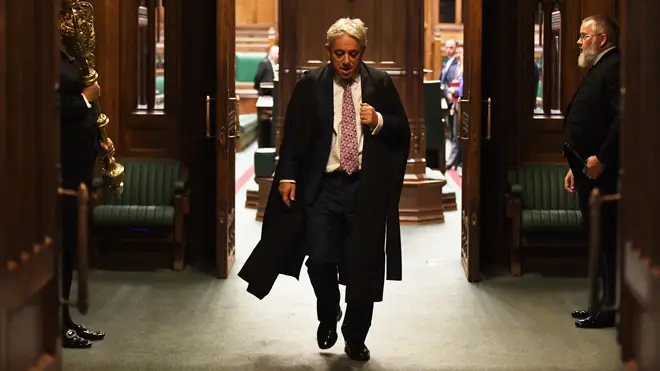
Clive Bull 1am - 4am
4 November 2019, 10:43 | Updated: 4 November 2019, 10:51

MPs are poised to choose John Bercow's successor in the first Speaker election in more than a decade.
Eight candidates are bidding to take on the role following Mr Bercow's departure, with the Commons business on Monday dedicated to this election.
Deputy Speaker Sir Lindsay Hoyle is among those strongly tipped to emerge victorious, with fellow Labour MP Harriet Harman - the current longest continuously serving female MP - also predicted to do well.
The other six candidates are Dame Rosie Winterton and Dame Eleanor Laing, who also both served as Mr Bercow's deputies, Labour's Meg Hillier and Chris Bryant (Rhondda), plus Conservatives Sir Edward Leigh and Shailesh Vara.
Mr Bercow departed the Speaker's chair on October 31.
The 56-year-old entered Parliament in 1997 and held several shadow ministerial positions before taking the Speaker's chair on June 22 2009, promising to serve "no more than nine years in total".
He abandoned that commitment ahead of the 2017 snap election, but allegations of bullying by former members of his staff, denied by the Speaker, led to fresh calls for him to quit.
In recent months he also come under fire for a series of controversial Brexit rulings in the chamber which were widely considered to favour Remain supporters.
Candidates must submit their written nominations between 9.30am and 10.30am on Monday, with their signed declaration needing to be supported by between 12 and 15 MPs.
The Commons will meet as normal at 2.30pm and each candidate will give a speech - the order decided by drawing lots.
A secret ballot among MPs will take place once the speeches have concluded.
MPs can only vote for one candidate and the result will be announced in the chamber.
Any candidate who receives more than 50% of the votes will be proposed to the House as Speaker, although MPs will be asked to vote again if no candidate meets the threshold.
In the second round of voting, candidates who either came last or received fewer than 5% of the votes will not be on the ballot paper.
There is also a 10-minute period after each round for candidates to withdraw.
Ballots will continue until either one MP wins more than 50% of the votes or only one remains.
A motion is then put to the Commons proposing the winner as Speaker and they will take the chair if this is agreed. If not, a vote takes place.
Speeches of congratulation are expected to follow the votes.